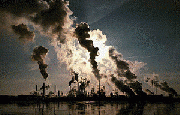DEARBORN/DETROIT – The South End residents of Dearborn and its bordering neighbors in southwest Detroit have probably grown familiar to the distinctive smell in the air from the nearby industrial plants, which have resided in the area for decades now. But according to a new study, many of these residents have also grown familiar to the disease of Asthma, at a rate that’s alarmingly higher than usual.
The new study, which is a collaborative effort between Wayne State University, Michigan State, University of Michigan and nonprofit based organization ACCESS from Dearborn, aims to examine the effects of respiratory health ranging from children to the elderly that live in Dearborn’s South End, which is highly polluted with environmental toxins.
Asthma is an inflammatory disease that is mostly caused through environmental factors such as air pollution or tobacco. While very few people diagnosed with the disease become terminally ill, it can cause severe affects such as chest pains, shortness of breath and increase the risk of lung cancer by 30%-40%.
The area the study is focusing on is the 48120 zip code in Dearborn, which includes three steel mills, an oil refinery and a wastewater treatment plant. Surrounding these factories are residential areas with an estimated population of around 7,500 and Salina Elementary School, where close to 500 students attend.
Still in its early stages, the study has already determined that the rate of Asthma hospitalizations in the area is more than double the average in the overall state.
Dr. Mary Dereski, an associate professor and the Director of the Wayne State University Family Medicine and Public Health Department has spearheaded the study and hopes the findings can eventually decrease the rate of Asthma in the South End.
“The study will allow us to determine preventative measures that ultimately will decrease the incidences of the disease,” Dereski said in a press release. “The entire community will benefit from the data we gather to affect policy change to improve air quality in this region.”
ACCESS will be contributing to the research by recruiting individuals in the fall who live in the South End and are willing to partake in these tests. The research, which is expected to take up to three years, will also focus on collecting air samples and examine them to determine any contents that might trigger asthma.
“We have a huge educational department that’s looking to educate residents on how to be aware of health issues like this” said Elizabeth Hughes, coordinator of ACCESS, whose headquarters also reside in the South End. “It’s very important that this issue does not get ignored due to the long term affects they are finding,” she added.
In total, there are 13 facilities in Dearborn that have reported their production of toxic chemicals to the Environmental Protection Agency (EPA). Among them is Severstal, the Russian based steel company (formerly the Rouge Steel Company) that is located in the 48120 area and annually makes the list as one of the top ten largest steel producers in the entire country.
In 2010, the plant reported over 543,000 pounds in chemical and toxic air emissions. That number is up drastically from 2009 where they reported 485,000 pounds and 2008 where they reported only 249,000 pounds.
A recent air quality study done by HomeFacts, a company that tracks data such as pollution, water quality and crime rates by city, ranked Dearborn’s air quality as a 2.5 out of 10. Neighboring cities such as Allen Park, Inkster and Westland were all ranked considerably higher. Ranked slightly lower on the list is southwest Detroit, with its 2.4 ranking being the worst in the entire state.
State House Representative Rashida Tlaib, the first ever Palestinian elected official in Michigan, has been a large advocate for addressing the air pollution problems in Southwest Detroit, which borders Dearborn’s South End.
In 2010, Tlaib started up a campaign titled “We Have a Right to Breathe,” which aims to not only improve the air quality in the area, but to also hold businesses accountable for any violations and stopping trucks from diving through the local neighborhoods.
“The public health of families in that area should be our biggest concern,” said Talib, who grew up in southwest Detroit and has family still living in both Detroit and Dearborn. “The children are breathing these horrific odors everyday while they are outside playing or going to school,” she added.
Tlaib, who represents the 48217 area code in Detroit, says that 1 out of 4 children that live in her area have asthma problems and that those numbers are on the rise due to the negligence by the local factories.
“The best thing the residents of Dearborn and Detroit can do is to call and make reports about strange odors and air releases they might see,” Tlaib stated. “If calls are continuously made to the Michigan Department of Environmental Quality, they are obligated to send out inspectors.”
Anyone looking to report strange odors or chemical releases can call locally at 313-456-4681 before 5pm. Those calling at night can contact the Michigan Department of Environmental Quality at 1-800-292-4706.






Leave a Reply